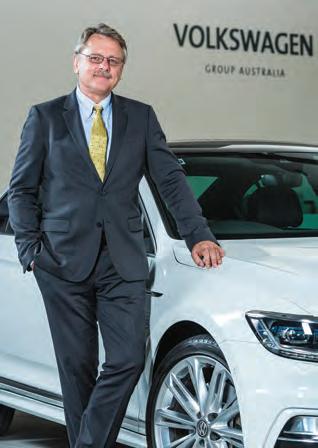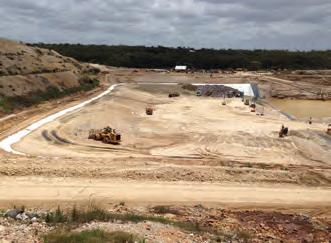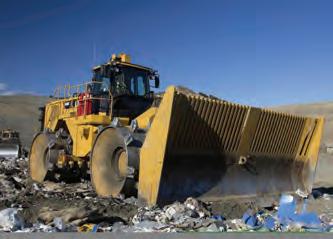
4 minute read
STOCKPILES DRIVE ACTION
VOLKSWAGEN HAS BECOME THE FIRST AUTOMOBILE COMPANY TO RECEIVE ACCREDITATION FROM TYRE STEWARDSHIP AUSTRALIA, WITH AUSTRALIA NOW SET TO SEE A FURTHER 400,000 TYRES DISPOSED OF RESPONSIBLY.
A2019 Tyre Stewardship Australia (TSA) audit of export markets showed some Australian recyclers were sending tyres overseas and failing to meet accredited recycling processes.
Tyres were reportedly being sold to businesses with poor health and safety practices, including those that engaged in stockpile burning.
According to the 2017 National Market Development Strategy for Used Tyres, Australia generated 447,000 tonnes of tyre waste in 2015-16. This represents the equivalent of 56.3 million end-of-life tyres and of those, only 10 per cent where recycled.
The strategy suggests tyre waste generation will continue to grow over the next 10 years, with new tyre sales expected to exceed 63.3 million by 2024-25.
TSA seeks to tackle this problem by signing up more tyre manufacturers, importers and retailers to its nationally accredited product stewardship scheme.
While a core function of TSA’s business is ensuring members commit to the responsible disposal of tyres, in recent years the scheme has shifted focus. Much of TSA’s recent activity centres on driving the commercial viability of the developing tyre-derived product market.
In June, for example, TSA accredited six new local councils
Volkswagen Group Australia’s Managing Director Michael Bartsch.
after they used tyre-derived raw material in infrastructure projects.
To further incentivise the use of tyre-derived products, TSA seeks widespread industry participation at all levels of the supply chain.
Volkswagen Australia General Manager Corporate Communications Paul Pottinger holds a similar view, arguing sustainable tyre recycling is the responsibility of all individuals and organisations working in the car industry.
This year, Volkswagen became the first auto company to co-sign the TSA accreditation scheme.
Presently TSA has 11 members, most of which are tyre manufacturers and retailers.
“I think most people in the industry are well aware of the worstcase practices, none of which are environmentally agreeable,” Paul says.
“For us, tyres are a by-product of the simple act of doing business, so it’s our obligation to ensure dealers engage in best practice and dispose of tyres sustainably.”
According to Paul, news that Australia’s biggest European car importer has joined TSA will hold significant weight and push similar action across the industry. He adds that Volkswagen sits on the board of the Chamber of Automotive industries – Australia’s peak industry body for car companies.
“The industry is changing in every respect, with increasing emphasis on developing business practices that are as environmentally conscious and sustainable as possible,” Paul says.
“It’s not up to Volkswagen to wag an admonitory finger at people, but we are very happy to lead the way for our colleagues.”
As part of Volkswagen’s TSA membership, 100-plus Australia Volkswagen dealerships are now committed to TSA’s accreditation requirements.
TSA commitments include increasing tyre resource recovery and recycling, growing Australia’s tyre recycling
industry though scheme promotion and assisting the development of endmarkets for tyre-derived products.
TSA also requires members to contribute to the elimination of inappropriate exporting and illegal dumping of end-of-life tyres through transparent collection reporting.
Paul says becoming aware that one of Volkswagen’s tyre suppliers was not a scheme signatory was a key prompt for Managing Director Michael Bartsch to get involved with TSA.
“When it was brought to our attention that one of our suppliers wasn’t working with the objectives of TSA, we decided it was important to get involved and take action,” Paul says.
“Looking forward, it is our intention to deal only with tyre manufactures who are TSA co-signatories, at the

exclusion of those who are not.”
The TSA program is funded by a levy imposed on tyre importers, and now Volkswagen as a vehicle manufacturer. The levy is calculated at a rate proportional to the number of tyres the member imports or sells into Australia.
The levy is used to support market development and research, organisational management costs and implementation of TSA’s end-of-life tyre strategy.
According to Paul, Volkswagen’s levy will annually apply to almost half a million tyres.
“Volkswagen will pay a levy based on an annual figure of 400,000-plus tyres, which represents roughly five tyres per vehicle sold based on 2018 sales figures,” he says.
Prior to becoming TSA member,


Volkswagen did not have a centralised tyre disposal policy in place.
“I don’t believe any car company has a centralised system. The management of disposal is often left to individual dealers,” he says.
“I’m sure disposal been done as responsibly as possible, but ensuring a TSA-accredited service is collecting Volkswagen tyres is unquestionably the best way forward.”
Paul says the simple act of recognising tyres as a waste stream is crucial to achieving TSA objectives.
“Tyre waste is not something a lot of people in the auto industry are thinking about,” he says.
“Volkswagen playing an active role in responsibly disposing of, and recycling, what would otherwise be a waste product is a huge step forward.”






